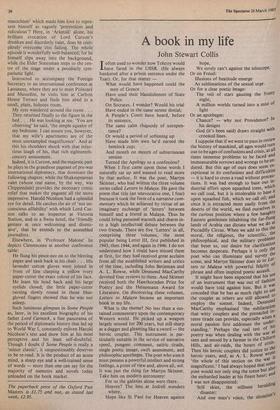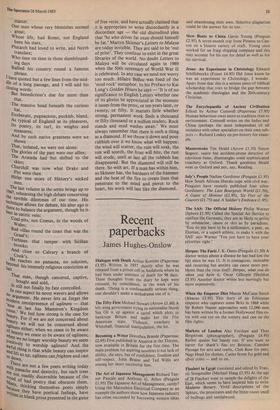A book in my life
John Stewart Collis
T often used to wonder how Tolstoy would have fared in the USSR. (He always hankered after a prison sentence under the Tsar). Or, for that matter —
What would have happened could the men of Greece Have used their blandishment of State Police On Socrates. I wonder? Would his trial Have ended in the same serene denial; A People's Court have heard, before its sentence, The same calm rhapsody of unrepen- t ance?
Or would a period of softening up Have made him own he'd earned the hemlock cup; And month on month of subterranean session Turned the Apology to a confession?
When I first came upon those words I naturally sat up and wanted to read more by that author. It was the poet, Martyn Skinner, who had written the three volume series called Letters to Malaya. He gave the poem that title (an unevocative one, I fear) because it took the form of a narrative com- mentary which he achieved by virtue of an imaginary exchange of 'letters' between himself and a friend in Malaya. Thus he could bring personal warmth and charm in- to a high intellectual debate between the two friends. There are five 'Letters' in all, comprising three volumes, the most popular being Letter III, first published in 1943, then 1944, and again in 1946. I do not understand how I could have missed them at first, for they had received great acclaim from all the established writers and critics of the time, including John Betjeman and A. L. Rowse, while Desmond MacCarthy devoted four reviews to them. And Skinner received both the Hawthornden Prize for Poetry and the Heinemann Award for Literature. On discovering these volumes, Letters to Malaya became an important book in my life.
What is the theme? No less than a sus- tained commentary upon the contemporary Western world. He picked up a weapon largely unused for 200 years, but still sharp as a dagger and gleaming like a sword — the heroic couplet. This instrument is par- ticularly suitable in the service of narrative speed, pungent comment, satiric tirade, single poetic image, swift assessment, and philosophic apothegm. The poet who uses it must possess a powerful intellect and strong feelings, a point of view and, above all, wit. It was just the thing for Martyn Skinner. Take him on modern astronomy:
For us the galaxies alone were there. Heaven? The lens at Jodrell wonders where.
Hope like St Paul for Heaven against hope, We surely can't against the telescope. Or on Freud: Illusions of beatitude emerge As sublimations of the sexual urge.
Or for a clear poetic image: The veilof stars gauzing the frostY night, A million worlds turned into a mist of light Or an apothegm: Chance? — why not Providence? In his designs God (it's been said) draws straight with crooked lines.
I suppoSe that if we were to pass in review the history of mankind, all ages would turn out to be ages of confusions and crisis, at all times immense problems to be faced and immeasurable sorrows and wrongs to be en- dured. But this age of ours does seem ex- ceptional in its confusions and difficulties — it is hard to cross a road without precau- tions. It was bad enough to base our in- dustrial effort upon squashed trees, which we call coal, but it is intolerable to base it upon squashed fish, which we call oil; and since it is extracted most easily from the deserts of the world, we find ourselves in the curious position where a few haughtY Eastern gentlemen inhabiting the far-flung lands of Arabia can dictate what we do at Piccadilly Circus. When we add to this the moral, the religious, the scientific, the philosophical, and the military problenls that beset us, our desire for clarification becomes desperate. Perhaps it is only the poet who can illuminate and survey the scene, and Martyn Skinner does so Ill Let; ters to Malaya with powerful felicity 0' phrase and ciften inspired poetic assault- It might have been expected that his use of an instrument that was out of fashion would have told against him. But it was conceded that he has as much right to use the couplet as others are still allowed to, employ the sonnet. Indeed, Desmona MacCarthy emphasised 'the exhilaration that witty couplets and the pinnacled in- tense tirade can provide, especially when a moral passion first addresses the under- standing.' Perhaps the real test of his poetry was when dealing with the war as seen and sensed by a farmer in the Chiltern Hills, and air-raids, the hours of crisis. Then his heroic couplets did justice to the heroic years, and, as A. L. Rowse wr()te 'the whole of this section on the war is magnificent.' I had always hoped that sortie° poet would not only sing the scene but alsA the embattled leader at his finest hour; an''' I was not disappointed:
Still skies, the stillness heral disaster; ding And one man's voice, the situation's master.
One man whose very blemishes seemed • great; Whose life, had Rome, not England been his state, Plutarch had loved to write, and North translate; Who time on time in those dumbfound- ing days Rallied his country round a famous phrase. I have quoted but a few lines from the mid- dle of a long passage, and I will add his closing words: But benediction's due for more than that.
The massive head beneath the curious hat, Exuberant, pugnacious, puckish, bland, As typical of England as its pleasures, Its Poetry, its turf, its weights and measures; And by such native greatness were we shown That, isolated, we were not alone: The glories of the past were our allies; The Armada had but shifted to the skies; Churchill was now what Drake and Pitt were then. Hitler one more of History's wicked men.
The last volume in the series brings up to 1947, rehearsing the high debate concerning the terrible dilemmas of our time. His technique allows for debate, his alter ego is ,Illere to balance the argument, though he is 'esr in satiric vein:
Coal-pits, not Comus, in the woods of Wales; Red villas round the coast that was the Graal's; Turbines that tamper with Sicilian brooks; And close to Calvary a branch of Cook's. He reaches no panacea, no solution, last
ueYond his intensely religious conviction at That man, though cancered, captive, bought and sold, Is still not finally by fate controlled. nr,In one aspect he never wavers and allows argument. He never lets us forget the omnipresence of ugliness — that ctic'w at last has Mammon's Kingdom We feel how strong is the case for kealnY. For if we are not concerned about ..'eaaty we will not be concerned about 41iness either; when we cease to be aware whbeaulY we cease to be aware of ugliness; Pawoseintive no longer worship beauty we seem elY to worship ugliness! And the anf,td thing is that while beauty can inspire a lift us up' ugliness can frighten and cast s down. „There are not a few poets writing today ar...ti Panache and dexterity, but such trees not readily discernible because of the 14-`00d of bad poetry that obscures them. Lane Y, thinking themselves poets simply wuceause they have poetical feelings, have 'n en in blank prose presented in the guise of free verse, and have actually claimed that it is appropriate to write discordantly in a discordant age — the old discredited plea that 'he who drives fat oxen should himself be fat.' Martyn Skinner's Letters to Malaya are today invisible. They are said to be 'out of print'. They continue to exist in the great libraries of the world. No doubt Letters to Malaya will be circulated again in 1989 when the 50th centenary of World War II is celebrated. In any case we need not worry too much. Hilaire Belloc was fond of the 'mud-rock' metaphor. In his Preface to Kai Lung's Golden Hours he says — 'It is of no significance to English Letters whether one of its glories be appreciated at the moment it issues from the press, Or ten years later, or twenty, or fifty. It matters little whether strong, permanent work finds a thousand or fifty thousand or a million readers. Rock stands and mud washes away.' We must always remember that there is such a thing as a diamond. If we throw it down and pour rubbish over it we know what will happen: the wind will scatter, the rain will soak, the sun will scorch, the frost will bite, the rust will erode, until at last all the rubbish has disappeared. But the diamond will still be there. So with art. If a man has within him, as Skinner has, the hardness of the hammer and the heat of the fire to create lines that penetrate to the mind and pierce to the heart, his work will last like the diamond.















































 Previous page
Previous page